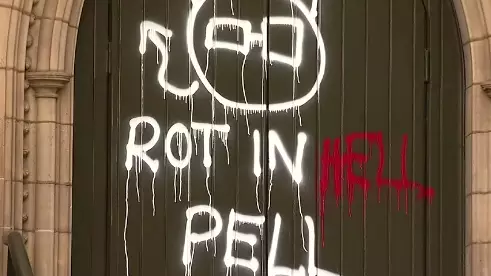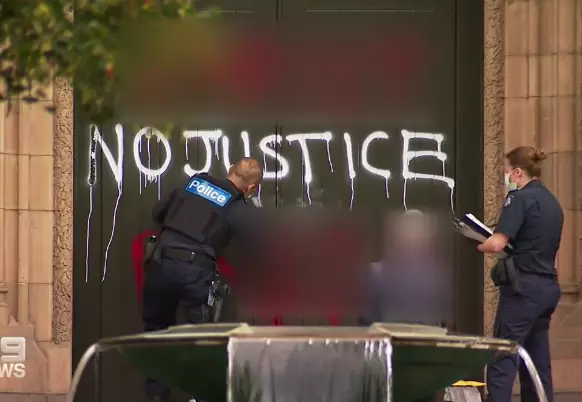
A Melbourne cathedral has been vandalised after Cardinal George Pell was released from prison.
The former high-ranking Catholic Church member was granted his freedom this week after the High Court of Australia quashed his historical child sexual abuse conviction and acquitted him of four counts of an indecent act with a child under 16, and on one count of sexual penetration.
After the 78-year-old was allowed to leave Victoria's Barwon Prison, St Patrick's Cathedral was graffitied with the words 'Rot In Hell Pell', 'no justice' and upside down crosses on doors of the building.

The location of the vandalism is significant because it is where Pell was accused of of abusing two 13-year-old choirboys in the late 1990s.
Advert
Archbishop of Melbourne Peter Comensoli said he's not surprised that someone would target the cathedral for vandalism.
"There's such strong emotions around all of these matters," he told 3AW radio.

When Pell was released from jail, he travelled to Carmelite Monastery in Kew in Melbourne's east.
Advert
The gates to that monastery were also a place of silent protest.
Someone attached a child's tricycle to the gates and another was captured wrapping it in ribbon, which is a sign of solidarity for child sexual abuse survivors.
Pell was granted his appeal after taking the matter to the highest court in Australia.

The High Court of Australia explained its decision when handing down the result; saying: "The High Court found that the jury, acting rationally on the whole of the evidence, ought to have entertained a doubt as to the applicant's guilt with respect to each of the offences for which he was convicted, and ordered that the convictions be quashed and that verdicts of acquittal be entered in their place.
Advert
"Their Honours went on to consider the evidence of a number of 'opportunity witnesses', who had described the movements of the applicant and others following the conclusion of Sunday solemn Mass in a way that was inconsistent with the complainant's account.
"Their Honours found that no witness could say with certainty that these routines and practices were never departed from and concluded that the jury had not been compelled to entertain a reasonable doubt as to the applicant's guilt.
"The Court held that, on the assumption that the jury had assessed the complainant's evidence as thoroughly credible and reliable, the evidence of the opportunity witnesses nonetheless required the jury, acting rationally, to have entertained a reasonable doubt as to the applicant's guilt in relation to the offences involved in both alleged incidents."
Featured Image Credit: Channel 9